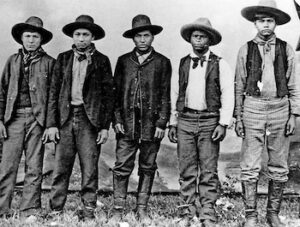
The Rufus Buck Gang
*The Rufus Buck Gang was formed on July 30, 1895. They were American Creek Indian and African outlaw criminals.
Their only crime spree occurred in the Indian Territory of Arkansas and Oklahoma in the summer of 1895. Rufus Buck formed the gang of Lewis Davis, Sam Sampson, Maoma July, and Lucky Davis. The gang began building up a small stockpile of weapons in Okmulgee, Oklahoma. After killing U.S. Deputy Marshal John Garrett on July 30, they held up stores and ranches in the Fort Smith area for the next two weeks. In one incident, a salesman named Callahan, after being robbed, was offered a chance to escape if he could outrun the gang. When the elderly Callahan successfully escaped, the gang killed his assistant. Also, at least two females who were raped by the gang died of their injuries.
Continuing attacks on both local settlers and Creek indiscriminately, the gang was captured outside Muskogee by law enforcement officers and Indian police of the Creek Light Horse, led by Marshal S. Morton Rutherford, on August 10 of that year. While the Creek wanted to hold the gang for trial, the men went before "Hanging" Judge Isaac C. Parker. He twice sentenced them to death, the first sentence not being carried out pending an ultimately unsuccessful appeal to the Supreme Court.
They were hanged on August 1, 1896, at 1 PM at Fort Smith. A slightly modified account of the gang's crimes is the basis for the novel Winding Stair by Douglas C. Jones. The Buck gang, "Hanging Judge" Isaac C. Parker, half-black, half-Indian outlaw Cherokee Bill, and the socio-political environment at the death of Indian Territory are the subjects of the 2011 historical novel I Dreamt I Was in Heaven - The Rampage of the Rufus Buck Gang by Leonce Gaiter.
The gang's story was told in the 2019 film Hell on the Border. The story inspired the 2021 Western film The Harder They Fall, and the 2024 movie The Night They Came Home is about the gang.